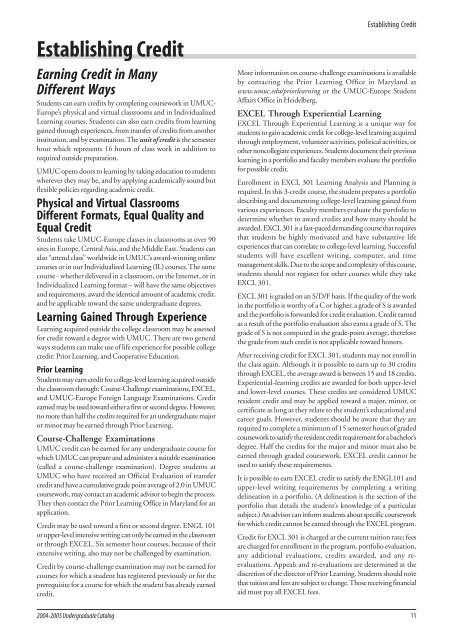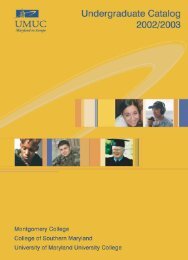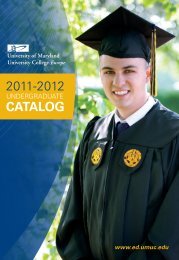Statements of Policy - UMUC Europe
Statements of Policy - UMUC Europe
Statements of Policy - UMUC Europe
You also want an ePaper? Increase the reach of your titles
YUMPU automatically turns print PDFs into web optimized ePapers that Google loves.
Establishing Credit<br />
Earning Credit in Many<br />
Different Ways<br />
Students can earn credits by completing coursework in <strong>UMUC</strong>-<br />
<strong>Europe</strong>’s physical and virtual classrooms and in Individualized<br />
Learning courses. Students can also earn credits from learning<br />
gained through experiences, from transfer <strong>of</strong> credits from another<br />
institution, and by examination. The unit <strong>of</strong> credit is the semester<br />
hour which represents 16 hours <strong>of</strong> class work in addition to<br />
required outside preparation.<br />
<strong>UMUC</strong> opens doors to learning by taking education to students<br />
wherever they may be, and by applying academically sound but<br />
flexible policies regarding academic credit.<br />
Physical and Virtual Classrooms<br />
Different Formats, Equal Quality and<br />
Equal Credit<br />
Students take <strong>UMUC</strong>-<strong>Europe</strong> classes in classrooms at over 90<br />
sites in <strong>Europe</strong>, Central Asia, and the Middle East. Students can<br />
also “attend class” worldwide in <strong>UMUC</strong>’s award-winning online<br />
courses or in our Individualized Learning (IL) courses. The same<br />
course - whether delivered in a classroom, on the Internet, or in<br />
Individualized Learning format – will have the same objectives<br />
and requirements, award the identical amount <strong>of</strong> academic credit,<br />
and be applicable toward the same undergraduate degrees.<br />
Learning Gained Through Experience<br />
Learning acquired outside the college classroom may be assessed<br />
for credit toward a degree with <strong>UMUC</strong>. There are two general<br />
ways students can make use <strong>of</strong> life experience for possible college<br />
credit: Prior Learning, and Cooperative Education.<br />
Prior Learning<br />
Students may earn credit for college-level learning acquired outside<br />
the classroom through: Course-Challenge examinations, EXCEL,<br />
and <strong>UMUC</strong>-<strong>Europe</strong> Foreign Language Examinations. Credit<br />
earned may be used toward either a first or second degree. However,<br />
no more than half the credits required for an undergraduate major<br />
or minor may be earned through Prior Learning.<br />
Course-Challenge Examinations<br />
<strong>UMUC</strong> credit can be earned for any undergraduate course for<br />
which <strong>UMUC</strong> can prepare and administer a suitable examination<br />
(called a course-challenge examination). Degree students at<br />
<strong>UMUC</strong> who have received an Official Evaluation <strong>of</strong> transfer<br />
credit and have a cumulative grade point average <strong>of</strong> 2.0 in <strong>UMUC</strong><br />
coursework, may contact an academic advisor to begin the process.<br />
They then contact the Prior Learning Office in Maryland for an<br />
application.<br />
Credit may be used toward a first or second degree. ENGL 101<br />
or upper-level intensive writing can only be earned in the classroom<br />
or through EXCEL. Six semester hour courses, because <strong>of</strong> their<br />
extensive writing, also may not be challenged by examination.<br />
Credit by course-challenge examination may not be earned for<br />
courses for which a student has registered previously or for the<br />
prerequisite for a course for which the student has already earned<br />
credit.<br />
Establishing Credit<br />
More information on course-challenge examinations is available<br />
by contacting the Prior Learning Office in Maryland at<br />
www.umuc.edu/priorlearning or the <strong>UMUC</strong>-<strong>Europe</strong> Student<br />
Affairs Office in Heidelberg.<br />
EXCEL Through Experiential Learning<br />
EXCEL Through Experiential Learning is a unique way for<br />
students to gain academic credit for college-level learning acquired<br />
through employment, volunteer activities, political activities, or<br />
other noncollegiate experiences. Students document their previous<br />
learning in a portfolio and faculty members evaluate the portfolio<br />
for possible credit.<br />
Enrollment in EXCL 301 Learning Analysis and Planning is<br />
required. In this 3-credit course, the student prepares a portfolio<br />
describing and documenting college-level learning gained from<br />
various experiences. Faculty members evaluate the portfolio to<br />
determine whether to award credits and how many should be<br />
awarded. EXCL 301 is a fast-paced demanding course that requires<br />
that students be highly motivated and have substantive life<br />
experiences that can correlate to college-level learning. Successful<br />
students will have excellent writing, computer, and time<br />
management skills. Due to the scope and complexity <strong>of</strong> this course,<br />
students should not register for other courses while they take<br />
EXCL 301.<br />
EXCL 301 is graded on an S/D/F basis. If the quality <strong>of</strong> the work<br />
in the portfolio is worthy <strong>of</strong> a C or higher, a grade <strong>of</strong> S is awarded<br />
and the portfolio is forwarded for credit evaluation. Credit earned<br />
as a result <strong>of</strong> the portfolio evaluation also earns a grade <strong>of</strong> S. The<br />
grade <strong>of</strong> S is not computed in the grade-point average, therefore<br />
the grade from such credit is not applicable toward honors.<br />
After receiving credit for EXCL 301, students may not enroll in<br />
the class again. Although it is possible to earn up to 30 credits<br />
through EXCEL, the average award is between 15 and 18 credits.<br />
Experiential-learning credits are awarded for both upper-level<br />
and lower-level courses. These credits are considered <strong>UMUC</strong><br />
resident credit and may be applied toward a major, minor, or<br />
certificate as long as they relate to the student’s educational and<br />
career goals. However, students should be aware that they are<br />
required to complete a minimum <strong>of</strong> 15 semester hours <strong>of</strong> graded<br />
coursework to satisfy the resident credit requirement for a bachelor’s<br />
degree. Half the credits for the major and minor must also be<br />
earned through graded coursework. EXCEL credit cannot be<br />
used to satisfy these requirements.<br />
It is possible to earn EXCEL credit to satisfy the ENGL101 and<br />
upper-level writing requirements by completing a writing<br />
delineation in a portfolio. (A delineation is the section <strong>of</strong> the<br />
portfolio that details the student’s knowledge <strong>of</strong> a particular<br />
subject.) An advisor can inform students about specific coursework<br />
for which credit cannot be earned through the EXCEL program.<br />
Credit for EXCL 301 is charged at the current tuition rate; fees<br />
are charged for enrollment in the program, portfolio evaluation,<br />
any additional evaluations, credits awarded, and any reevaluations.<br />
Appeals and re-evaluations are determined at the<br />
discretion <strong>of</strong> the director <strong>of</strong> Prior Learning. Students should note<br />
that tuition and fees are subject to change. Those receiving financial<br />
aid must pay all EXCEL fees.<br />
2004-2005 Undergraduate Catalog 11






